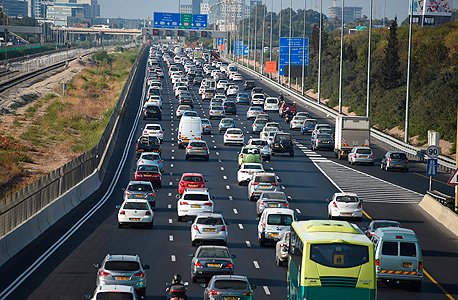The Ministry of Finance plans to present a congestion charge in the Tel Aviv area to the next government as part of the 2020 Economic Arrangements bill. The Ministry of Finance and the Israel Tax Authority's internal estimate for revenue from the charge is NIS 1.5 billion a year. In order to make it easier for the next government to pass the plan, which is expected to arouse public opposition, it is planned to use the revenue to lower vehicle registration fees for drivers and to increase the budget for public transportation. The Ministry of Finance is also considering parking charges.
NIS 1.1 billion of the revenue will be used to reduce vehicle licensing fees, and NIS 400 million will be added to the budget for public transportation during peak hours, mainly buses.
The Ministry of Finance estimates the time needed to prepare for implementation of a congestion charge at two years from the time that the decision is made. Preparations will probably include establishment of a tender for vehicle identification technologies, automatic clearance, and chips for wireless identification to be installed in all new vehicles sold in Israel, and in used vehicles as a condition for the annual vehicle test. The system will apparently also be supported by a mobile phone app that will notify drivers of the variable congestion rates according to location and time, and will enable them to calculate individual and cumulative costs.
A congestion charge is part of a comprehensive plan being prepared by the Ministry of Finance for presentation to the next government for the purpose of reducing the use of private vehicles. The plan is designed to deal with the problem of road congestion, mainly at the entrances to the Tel Aviv area at peak hours. The Ministry of Finance and the Ministry of Transport have realized that the large current investments in light rail transportation and future investments in the metro will not relieve road congestion in the coming years, and may even aggravate the problem because of the extensive work on traffic arteries. The Ministry of Finance therefore decided on immediate implementation of measures for reducing road congestion through negative incentives aimed at deterring the use of private vehicles, such as the Netiv Plus shared transport lane and a toll road at the entrance to Tel Aviv from Road 1.
The congestion charge is designed as the most important part of the overall plan that the Ministry of Finance has been trying to push for several years, but has so far held back because of opposition from former Minister of Transport Yisrael Katz. Current Minister of Transport Bezalel Smotrich is not publicly opposing a congestion charge, but there is little likelihood right now that he will be minister of transport in the government that will have to approve the plan.
OECD: The public will get used to it
Specialists from the Organization for Economic Cooperation and Development (OECD) presented a working paper to the state last week recommending a congestion charge in Tel Aviv. The plan defines a radius around the city center and levying a charge on every vehicle coming within that radius. Another option offered by the experts for consideration is establishing three concentric circles around central Tel Aviv and imposing a differential charge between them.
The paper was presented at the Future Mobility IL conference on transportation policy. According to the OECD study, international experience accumulated in recent years in cities in which the plan is being implemented - London, Stockholm, and Singapore are prominent example - shows that congestion charges on a similar format to the one proposed for Tel Aviv can reduce waiting time in traffic jams at peak hours by 30%.
The main problem with the plan is the strong public opposition that it arouses. The OECD asserts that public opposition wanes with time, as the public gets used to the congestion charge if it is applied uniformly. Katz claimed that imposing a congestion charge constituted a tax for all intents and purposes as long as drivers had no suitable alternative transportation for entering Tel Aviv at peak hours.
25% discount on licensing fees
State revenue from vehicle licensing fees amount to NIS 4-5 billion a year, so theoretically, the congestion charge can reduce them by up to 25%. In practice, the fees vary according to the type of vehicle and other criteria, so it is hard to tell what percentage discount a specific driver will receive.
In addition to appeasing opposition to congestion charges, discounts on vehicle licensing fees are also designed to serve current transportation policy, because they also benefit drivers who use vehicles in outlying areas or at non-peak times, and therefore pay no congestion fees.
The Tax Authority will also probably recommend against recognizing employers' expenses for the congestion charges of their employees for tax purposes. Congestion fees will be classed as a private expense of the employee, not an expense for work purposes or creating taxable revenue.
Another recommendation is taxing the value of the free parking currently granted by some employers to their employees. The value of the benefit will be calculated according to the average cost of a parking space. In high-demand areas, this cost can reach tens of thousands of shekels a year. It is still unclear what method will be used to calculate the usage value of this benefit.
Open questions
Amount of the charge: It is believed that NIS 10 will be charged for a daily entry to the Tel Aviv area.
Areas of the charge: It is still unknown in which areas the charge will be imposed, and whether costs will be graduated between different areas.
Technology: It is unknown whether cameras will be installed to identify vehicles, or whether chips will be installed on vehicles.
Related News

